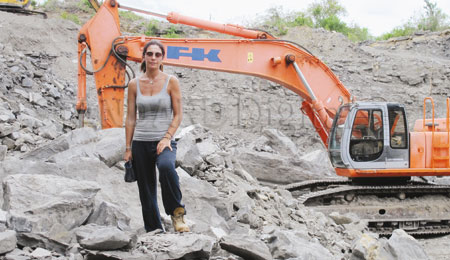×
The Standard e-Paper
Home To Bold Columnists
 |
| Naja at the mines in Kilifi.PHOTOS: JECKONIA OTIENO/STANDARD] |
During the Tana Delta clashes, which saw the death of more than 100 people last year, many organisations came together to help save the situation — one of them was Duma Foundation. The foundation is an offshoot of a larger investment, Duma Crusher, headed by a resilient woman.
Naja Dahmani, the CEO of Duma Crusher is not your typical power-wielding boss lady. She is down-right down-to earth and if you meet her in the mines chatting and mingling freely with her staff, you would think she is one of them.